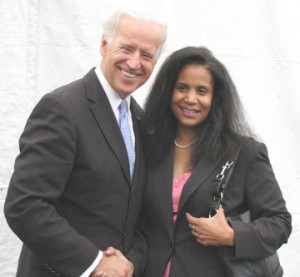
Lanette Rozier ’75, chair of Monmouth for Change, is greeted by Vice President Joe Biden at the 2009 Presidential Inauguration.
As she helps others follow their instincts, therapist Lanette Rozier ’75 allows her own inner voice to guide her through life’s most challenging decisions. Her choices have led her to a thriving practice in Millstone Township, N.J., and to the inauguration of President Barack Obama in January 2009.
During the 2008 presidential election, Rozier was chair of a grassroots organization called Monmouth for Change, which supported the then-fledgling presidential campaign of Barack Obama.
“I felt compelled to do something,” she explains. “Fifty years from now, I didn’t want to say that I sat on the sidelines.”
“It was an incredible experience that took me from my neighborhood all the way to the inauguration and the inaugural ball in Washington, D.C.,” Rozier says.
An anthropology and sociology graduate, Rozier was a member of Association of Black Collegians at Lafayette. Her interest in social and political issues prompted her to give back to the community through Black Children Can, a mentoring and tutoring program for disadvantaged children in Easton.
“This experience created a strong emotional awareness in me as well as a feeling of responsibility for giving back and participating in the political process,” she says.
Rozier’s interest in human behavior laid the foundation for her successful 27-year career. She has found that relationship issues often involve transitions.
“We all experience transitions in life. We enter the workforce, suffer loss, or experience illness,” she says. “To maintain happiness, individuals need to learn to master these transitions. All of us are equipped with the ability and the knowledge to heal ourselves. As a therapist, it’s my job to assist in the uncovering of knowledge within and help others trust their instincts so they can achieve serenity.”
Instincts can provide a powerful defense mechanism, a guide to effective decision-making, and a path to healing.
“It’s so common that people deep down inside know what they need to do, but they become paralyzed and inactive because external factors cause them to question their instincts,” she says.
Therapy is a process of sifting through all that clouds the inner voice.
“As a therapist, my training and the advantage of distance help me guide people through their internal maze so they can get in touch with their instincts,” she explains.
Rozier, who holds a master’s in social work from Rutgers University, is certified in Imago Relationship Therapy and is an authorized trainer in Mental Health First Aid (MHFA).
“Imago relationship therapy uses communication to look beneath conflict in a relationship,” she says. “Often this involves examining conflicts in relationships from childhood and making connections between those experiences and current issues.”
The therapist coaches couples on effective listening and verbalization skills.
“Teaching people how to listen is just one part of it. If they don’t learn how to respond with empathy and truly express their own feelings, then they aren’t really going to feel understood and accepted,” she says.
An Australian program, MHFA provides training on methods of assisting someone who may be in the early stages of developing a mental health problem or experiencing a mental health crisis.
Rozier is sensitive to cultural differences and uses her knowledge to apply best practices relative to her clients’ background.
“In the past, therapy was ‘one-size-fits-all,’” she says. “We now pay more attention to cultural diversity because we have learned that an individual’s cultural and moral beliefs impact overall perception.”
According to Rozier, research has shown that minorities and other ethnic groups tend to seek treatment later, are less self-disclosing, and rely more on family and community for support. She notes that this generalization does not apply to everyone, but being aware of differences is important in determining the most effective approach.
